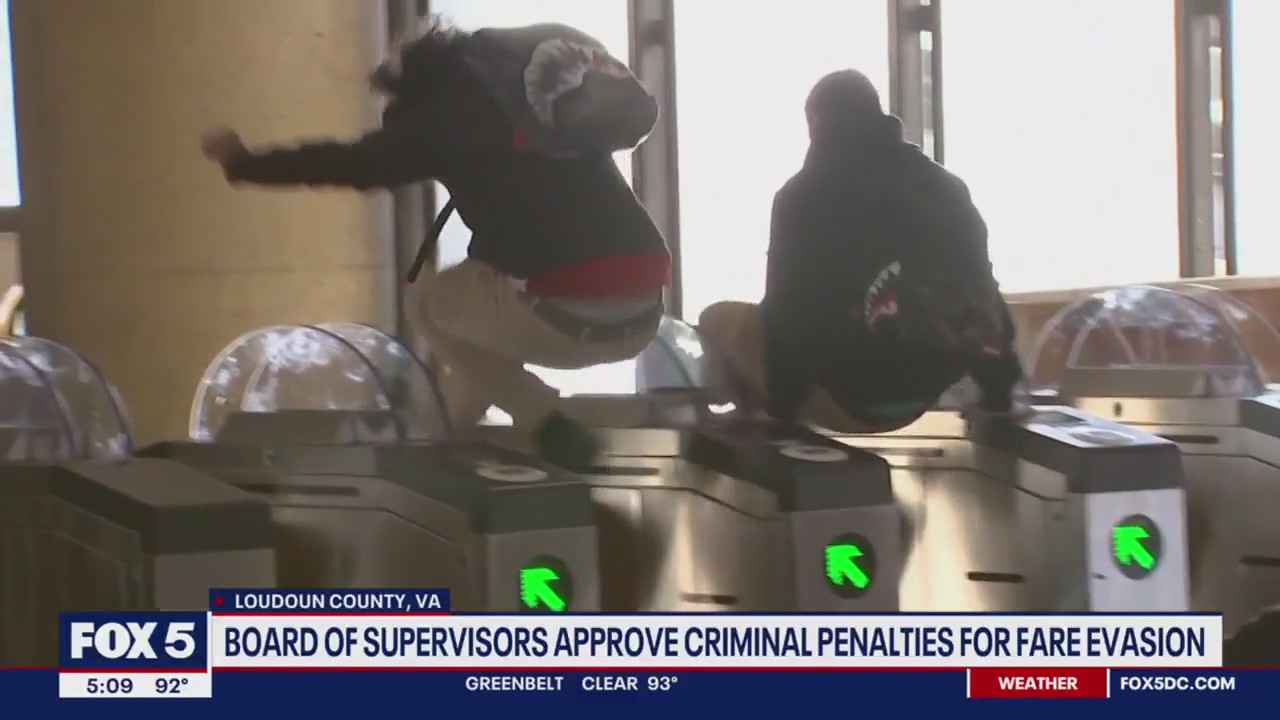Loudoun County takes action to crack down on Metro fare evaders

Board of Supervisors approve criminal penalties for fare evasion in Loudoun County
The Loudoun County Board of Supervisors unanimously passed changes to the law in the county to address fare evasion and other crimes that may happen on the Metro system. FOX 5's David Kaplan breaks down the new rules.
The Loudoun County Board of Supervisors unanimously passed changes to the law in the county to address fare evasion and other crimes that may happen on the Metro system.
Prior to a couple of months ago, before the Silver Line extension, Loudoun County didn’t have Metro.
That essentially meant they didn’t have specific laws to address crimes that may occur.

Before this passed, police could not stop people who evade fares. Now that fare evasion is considered a criminal misdemeanor, they can.
The Board of Supervisors took a longer, deliberative process to determine how misdemeanors might be classified.
What they landed on was that more serious offenses like interfering with operations or dangerous actions like riding the metro outside the rail car, were class one misdemeanors, punishable by up to a year in prison and a fine.
Fare evasion, which is something Metro has tried really hard to crack down on, is an unclassified misdemeanor. It could be a $50 fine the first time you’re caught and $100 each time after, with no possibility of jail time.
Matt Letourneau is a Loudoun County Supervisor and Metro Board member.
He echoed something Metro leadership has said over the last few years; stopping fare evasion makes the system safer overall.
"Not everybody who fare evades is a criminal, but virtually every criminal on our system fare evades. So this is not just about actually collecting revenue, but a sense of order on the system and making sure that individuals who really have ill intent are not able to be on the system," Letourneau said.
Metro is spending millions on new gates in a handful of stations that will make it tougher to evade.
Letourneau says the vast majority of fare evasions in Loudoun County took place at Dulles International Airport Station.
Metro General Manager Randy Clarke and Metro Transit Police Chief Michael Anzallo have previously said cracking down on fare evasion makes the whole system safer.
Anzallo testified to that in a Loudoun County Supervisors meeting last month.
"When we ramped up fare evasion in 2017, 2018, our crime dropped off tremendously when we did those enforcement efforts," Anzallo said during the meeting.
These changes in Loudoun County would bring its three stations in line with other Virginia stations in terms of giving police the availability to stop people who evade fares and ask for identification, and give them the opportunity to pay the fare or be subject to the fine.
In D.C., fare evasion was decriminalized in 2019; however, proposed legislation from Councilwoman Brooke Pinto would give police in D.C. more of an ability to stop someone who evades a fare.

This decision was tabled in Loudoun County in previous months.
Supervisor Koran Saines says he was concerned about over-enforcement for minor offenses, but feels what Loudoun County came up with hits the right notes.
"In crafting this ordinance, the board recognized that fare evasion is a serious problem and that we cannot let it go unpunished. We also recognized that things like eating on a train or littering are not acceptable conduct either and warranted punishment. However, we were able to do this while avoiding the problems associated with excessive criminalization where the punishments are not proportionate to the misconduct," Saines said in a statement.



